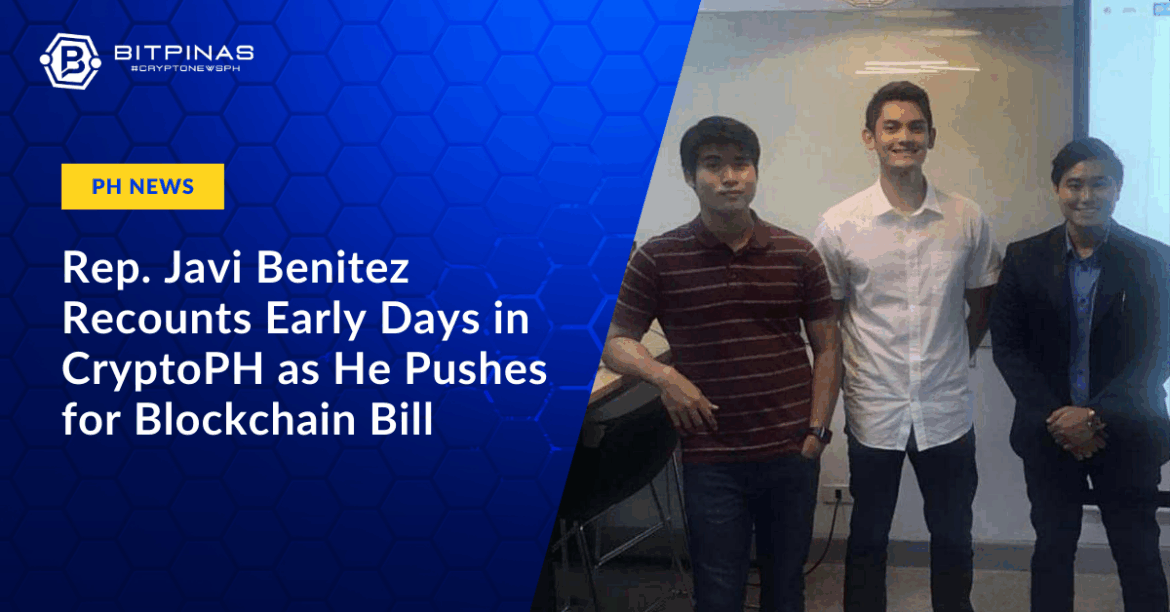Disclaimer: This article is for informational purposes only and does not constitute financial advice. BitPinas has no commercial relationship with any mentioned entity unless otherwise stated.
📬 Get the biggest crypto stories in the Philippines and Southeast Asia every week — subscribe to the BitPinas Newsletter.
Following his proposal of a National Budget Blockchain System, Negros Occidental 3rd District Representative Javier Miguel Benitez recalled that he was already active in the Philippine blockchain community, in which he joined discussions that highlighted the technology’s potential beyond trading.
Benitez in the Local Blockchain Space
In a Facebook post, Benitez recounted his early participation in blockchain events in 2018, starting with the CEZA Fintech Summit, where he joined a panel on regulation versus innovation. Three days later, he attended the Beach Blockchain Conference in Cebu, where he heard industry figure Brock Pierce describe the Philippines as a potential “block producer.”




On May 30 of the same year, Benitez was welcomed into the Blockchain Association of the Philippines at QBO Labs, where he shared that it deepened his understanding of technical concepts. By June 21, he spoke at the Makati Digital Currency Meetup, shifting the discussion from market speculation to practical blockchain solutions.
“Trust shouldn’t rest on individuals or institutions, it should be built into transparent, immutable, and verifiable systems. Looking back, I’m glad to have been part of those early conversations. Looking forward, the challenge is to turn blockchain from speculation into real solutions that improve lives.”
Javier Miguel Benitez, Representative, 3rd District, Negros Occidental
In another post, he highlighted that the proposed measure mandates the use of a secure digital record where every transaction is permanent and tamper-proof.
“The goal is to make every peso publicly traceable and visible in real time, so that citizens, watchdogs, and lawmakers can independently verify where funds go, down to the project, agency, and centavo. If passed, this measure would make the Philippines a pioneer in open-budget governance, proving that modern technology can fight corruption, strengthen accountability, and give the people clear access to how public money is spent.”
Javier Miguel Benitez, Representative, 3rd District, Negros Occidental
He also added that the measure complements Senate Bill 1330, filed by Senator Bam Aquino, which also seeks to integrate blockchain technology into the budgeting system.
In reply to BitPinas’ query on whether Benitez’s prior blockchain experience gives him an advantage in filing the bill, Atty. Rafael Padilla, author of Crypto and the Law and co-founder of BlockDevs Asia, said the lawmaker’s early engagement provided him with strategic insights on applying blockchain to governance and transparency, making his legislative initiative particularly meaningful for the community.
“It’s essential for a lawmaker pushing for the adoption of the blockchain to be immersed in the local blockchain community… Through his active involvement, he must have gained strategic insights on how blockchain can be harnessed for various use cases, including public governance and to promote transparency.”
Atty. Rafael Padilla
Padilla recalled being with Benitez at the 2018 Blockchain Beach Conference, the CEZA Fintech Summit, and several meetups organized by Makati Digital Currency and BlockDevs Asia, noting that Benitez even helped co-organize the first Decentralized Innovation and Startup Hackathon (DISH 2018).
Moreover, he added that Benitez’s proposal to put the national budget on blockchain could encourage more policymakers to take the technology seriously.
“Javi’s proposal significantly contributes to the acceptance of blockchain as a solution to some of our existing social problems like corruption. Blockchain won’t be a panacea and the technology alone will not eradicate corruption, but his proposal is a critical step in the right direction. It’s early to say whether his proposed bill will eventually be enacted into law, but it’s a cause worth fighting for.”
Atty. Rafael Padilla
House Bill No. 4380: Philippine National Budget Blockchain Act
The bill aims to establish a blockchain-based national budget system that records all budget processes, from preparation and legislation to execution and audit, as “Digital Public Assets.”
According to the bill, the proposed blockchain budget system must ensure immutability of records, decentralized validation to prevent control by a single entity, and full traceability of funds from appropriation to actual spending. It should also provide strong security and resilience through encryption and backups, and maintain interoperability with existing and future government systems.
Key Players and Responsibilities
- Designated implementing agencies:
- Department of Information and Communications Technology (DICT)
- Department of Budget and Management
- Commission on Audit
The bill also noted that all government agencies (including government-owned or controlled corporations) must integrate their financial management, procurement, accounting, reporting systems, etc. into the blockchain system, following interoperability standards.
Implementation and Practicals
- DICT leads the development, deployment, and maintenance; it may engage private tech providers or academic institutions under procurement rules.
- Smart contracts may be used to automate the release of funds when specific verifiable conditions, like approval or milestones, are met.
- A public-facing portal that allows citizens and oversight bodies to verify fund flows in real time, down to the project and beneficiary level.
Budget and Timeline
- Initial funding of ₱500,000,000 to come from the National Treasury to cover setup costs, including research, infrastructure, integration, and training.
- After initial implementation, continued maintenance shall be included in subsequent General Appropriations Acts.
- Rules and regulations for implementing the law must be formulated within 90 days of effectivity.
- Effectivity takes place 15 days after publication in the Official Gazette or in a newspaper of general circulation.
Other Blockchain Bills Filed:
This article is published on BitPinas: Rep. Javi Benitez Recounts Early Days in CryptoPH Scene as He Now Pushes for Blockchain Bill in Lower House
What else is happening in Crypto Philippines and beyond?

